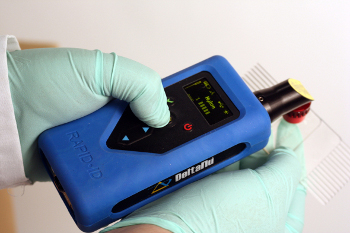Jun 12 2012
Analytik, leading suppliers of innovative analytical instrumentation, report on the work of Dr Jonathan Burley from the University of Nottingham. He is using one of the smallest Raman spectrometers in his academic research and teaching focusing on its ability to provide rapid sample analysis.
Dr Jonathan Burley is a lecturer in Pharmaceutical Nanotechnology at the University of Nottingham. His research interests focus on measuring and understanding change in pharmaceutical materials. This includes changes that occur with time, temperature, position in sample, addition of solvent, etc. Phenomena of interest include crystallisation, polymorphism, hydration, dehydration, mapping of components in tablets and other drug delivery vehicles, formation of salts and co-crystals.
 The RAPID.ID handheld Raman spectrometer used in teaching at the University of Nottingham.
The RAPID.ID handheld Raman spectrometer used in teaching at the University of Nottingham.
While he uses a multitude of analytical techniques, he is particularly interested in those which produce rapid spatial analysis results when mapping tablets and complex drug delivery vehicles. This is also recognised as important for the quality of control of medicines and understanding controlled release processes. One new technique being applied in the laboratory is the RAPID.ID palm-sized Raman spectrometer supplied by Analytik.
Speaking of his work, Dr Burley said "The new Raman system is really impressive. We are using the spectrometer for monitoring laboratory reactions in solvents to see if we can remove the requirement for NMR, TLC and other techniques. Our motivation is around green chemistry and simply making it easier for chemists to provide rapid information output such as kinetics, extent of reaction, etc. This miniature spectrometer helps to achieve this, and is convenient and reliable to use."
For students, this is a great introduction to Raman spectroscopy as often access to benchtop systems is restricted to research use. The compact and rugged design of the RAPID.ID makes it an ideal screening tool to help with the most routine of testing challenges helping to make Raman spectroscopy accessible to all.
Speaking about applications for the RAPID.ID, Analytik's Marketing Manager, Tom Greenwell, said handheld spectrometers are becoming widely used in many types of laboratory from the teaching lab through to routine quality control in industry. For example, in forensics, you may identify alcohol, paint, fertiliser and drugs while in the pharmaceutical industry, it is possible to identify counterfeit products and packaging. Linking to the green motivations of Dr Burley, we are also finding applications to help identify polymers for recycling."